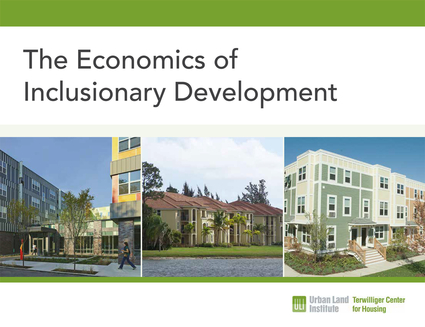

The Economics of Inclusionary Development
ARCHITECTURE
50 Pages, 11 x 8.5
Paperback, $12.95 (US $12.95) (CA $16.95)
Publication Date: December 2016
ISBN 9780874203820
Sorry, this item is temporarily out of stock
Overview
With nearly 10 million low- and moderate-income working households paying more than half their income towards their rent or mortgage, cities are increasingly using their zoning authority to encourage the development of new workforce housing units. A study by the ULI Terwilliger Center for Housing assesses and illustrates the economics of the most common approach: inclusionary zoning (IZ). Through IZ, cities require or encourage developers to create below-market rental apartments or for-sale homes in connection with the local zoning approval of a proposed market-rate development project. This study–based on in-depth analytic modeling, an extensive literature review, and interviews with developers and other land use experts–provides such advice on what incentives work best in which development scenarios. The study’s purpose is to enable policy makers to better understand how an IZ policy affects real estate development and how to use the necessary development incentives for IZ to be most effective.
Author Biography
Stockton Williams is Executive Director of the Urban Land Institute Terwilliger Center for Housing. The Terwilliger Center represents the residential development interests and priorities of ULI’s 36,000 members in all residential product types, including a deep commitment to affordable and workforce housing. Stockton was previously Managing Principal of the Washington, DC office of HR&A Advisors, which advises cities across the U.S. on public-private development projects. Prior to joining HR&A, Stockton served as Senior Advisor in two Federal Cabinet agencies: the U.S. Department of Housing and Urban Development and the U.S. Department of Energy. He has also been Senior Vice President and Chief Strategy Officer at Enterprise Community Partners; a Senior Advisor at Living Cities; a Senior Legislative and Policy Associate at the National Council of State Housing Agencies; and a developer of affordable housing. He is Chairman of the Board of Groundswell, an innovator in harnessing community economic power for the common good. He holds an M.S. from Columbia University and a B.A. from Princeton University.





